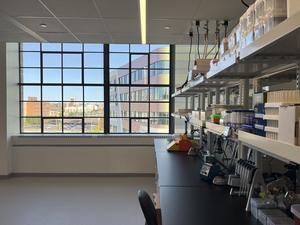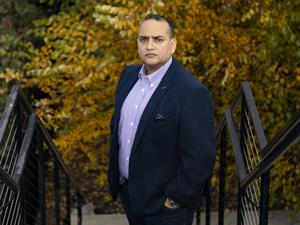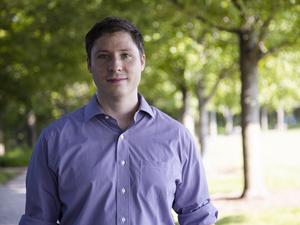When Clever Real Estate moved into a new office in 2018, it expected its new home could hold upwards of 100 employees.
At the time, Clever only had a staff of about 20 employees, but with the new office in the Delmar Loop, the startup made a bet on its future. Rather than having to continually juggle the task of finding a new office to fit a growing team, Clever wanted a headquarters that it knew it wouldn't outgrow for a while.
A few weeks ago, Clever, which has created technology that connects home sellers to real estate agents, finally surpassed that 100-employee threshold. But it has no plans to find a new office.
Clever is among a group of local startups that have shifted to remote and hybrid operating models during the Covid-19 pandemic. While many still keep a physical office, they aren’t mandating employees be there every day. That marks a significant change for local startups, who prior to the pandemic believed in-person work was critical to cultivating the kind of workplace culture that can enable rapid growth for their young companies.
That philosophy also resulted in growth-related complications. The rapid pace at which some startups grew, and their preference for offices with amenities that can attract top talent, made it difficult for them to find space tailored for their needs. Startups excel at bringing new ideas to market, scaling up teams and raising funds. Managing ever-changing real estate needs could often be a headache.
“It's amazing to not have to worry about it,” said Luke Babich, co-founder and CEO of Clever. Now, "if our landlord ever tried to hold us over a fire, we also can very happily downsize or even go without an office for a period of time when we look. It takes the pressure out of it in a big way.”
Few startups are ditching the office altogether and some remain fully committed to in-person work as they expand their teams. But the pandemic, and subsequent embrace of remote work, has created a new dynamic for how young companies locally pursue office space.
“Prior to the pandemic, well-funded startups would gobble up space. They would 'overspace' themselves,” said Eric Galanti, senior vice president of Chicago-based CBIZ Gibraltar Real Estate Services that represents clients looking for space throughout the region. "What the pandemic has done and hybrid work is allowing is for companies to focus on quality over quantity, meaning they might take less space but they're going to invest in making cool places for employees to come. When employees come in the office, they want it to be impactful.”
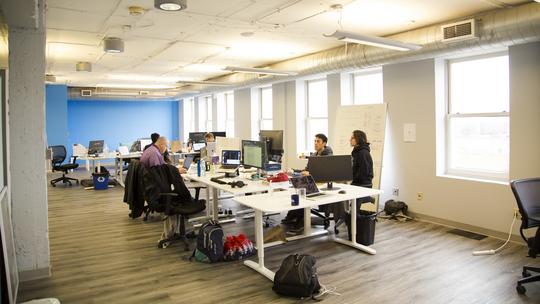
Not your typical tenant
Prior to the pandemic, Clever had a few remote software engineers, but the bulk of its team was based in St. Louis and worked out of its office in the Delmar Loop. Today, Babich said there’s typically only two to six employees in the office most days. Babich himself typically works from home.
The decision by Clever to work remotely wasn’t necessarily intentional. Much of its growth has come since the start of the pandemic, when it was forced to work remotely. The home office became the natural location for its operations.
“We went from a team of 25 to 70 coming into this year, give or take, and through that whole time we were fully remote,” Babich said. “So by the end of it, you come out and you're a remote company.”
Prior to 2020, a startup allowing its employees to work from wherever they wanted would have been considered problematic and a possible red flag for investors.
“Before the pandemic, it was believed that companies with cohabitated teams earned a valuation premium over companies with distributed teams working virtually,” said Cliff Holekamp, co-founder and general partner of St. Louis venture capital firm Cultivation Capital.
But finding the right office space was often harder for startups than a typical tenant. Using capital efficiently at that stage can be critical, and young companies, even those that are well-funded, would limit what they were willing to spend on lease payments or tenant improvements. And for the most successful companies, rapid headcount growth made it a struggle to lock into long-term leases for offices they were likely to outgrow in just a couple years.
“When a startup needs space, they don’t really have a lot of dollars to invest in the space,” said Galanti. "They want to invest in the company and the people and I still think it’s a challenge to find improved space, specifically in St. Louis, that is ready to go — what we call plug-and-play options for startups or young companies.”
In Clever’s case, the key to moving into its headquarters in 2018 was finding a landlord, Joe Edwards, the owner of multiple buildings and businesses in the Delmar Loop, that was willing to provide flexible terms that fit both its short-term limitations and long-term growth ambition.

The mentorship concern
In 2021, FinLocker CEO Henry Cason made two attempts to bring the financial technology startup’s employees back to its 4,000square-foot office in Clayton.
FinLocker, which provides software to help individuals manage their finances, initially tried a voluntary approach. Cason, who is based in the Washington, D.C., area, began traveling to St. Louis more frequently, working with other senior leaders in the office. He figured that might entice other employees to join them, but there were few takers.
About a year ago, Cason drafted a hybrid work model that would require FinLocker employees in St. Louis to return to the office three days a week. FinLocker has a team that includes a mix of junior and senior employees, and Cason said that plan sought to foster more connections between the two groups.
“While we see no impact around productivity with people working from home, one of the impacts I did see and was concerned about was mentorship,” he said. “If I’m a junior developer, how am I going to get better if I’m not constantly sitting next to the senior developer, who at a moment's notice can look over my shoulder and critique my line of code.”
But when the hybrid plan was shared with employees, Cason said they told management they wanted specific reasons, such as meetings and events, for why it was necessary to bring them back to the office. It’s feedback Cason took seriously. He scrapped the proposed hybrid approach. FinLocker has 35 employees, with about half located in St. Louis.
Now FinLocker operates with what its Cason calls an “events-based” approach to using the office. Its team meets every other Wednesday in Clayton for strategy meetings and software testing. As for mentorship, Cason said FinLocker conducts mentorship meetings when it is together on Wednesdays.
“We’re more purposeful about it rather than letting it happen organically,” he said.
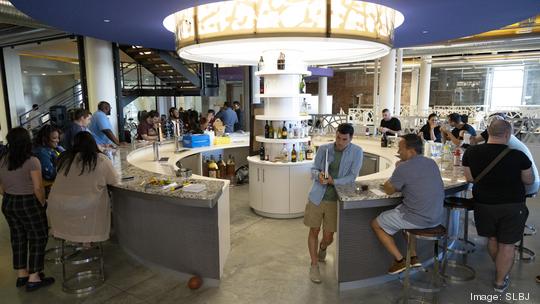
FinLocker isn't the only St. Louis startup to position its office use around events. In 2021, contact center software startup Balto expanded its footprint, moving into a new 23,000-square-foot office in Downtown West. Balto Vice President of Operations Erin Ryan says about 10 to 15 employees are in the office daily, accounting for roughly 20% of its local workforce. She said Balto has focused more on using its office as a central location to bring together its 130 employees for events.
Prior to the pandemic, Balto operated out of the T-Rex entrepreneurship center Downtown. Its team worked fully in office and the startup struggled prior to the pandemic to find a space that could fit its growing team and needs.
Now, under a hybrid model, Ryan said Balto expects to be able to remain in its current office longer than it would had it continued with its prior in-person model. Balto had a right of first refusal on two other floors within its building, but gave the green light for the landlord to lease those to another tenant. The artificial intelligence technology firm Scale now occupies that space.
“When we do all-hands meetings, we’re a little cramped, but we know we have a number of co-working opportunities in Downtown that are really close that we can utilize if we need just a little more space for those occasional things,” Ryan said.
Crowded - but worth it
EmpowerMe Wellness' Brentwood headquarters is a little crowded these days.
The provider of senior health services, which earlier this year announced it has raised $100 million-plus from investors, has added hundreds of people to its staff this year. More than 500 of its 2,880 employees are based locally.
In December, the company moved into its new headquarters in Brentwood. It had already left a previous space in Clayton after outgrowing it. Now, it's already reached capacity in Brentwood.
While many St. Louis startups have pared back their use of physical office space, EmpowerMe Wellness is an example of a company that remains committed to in-person work while also grappling with the challenge of trying to manage its office needs as it expands rapidly.
It’s not alone.
TCARE, which has developed technology to aid senior caregivers, has added 160 employees in the past three years. This month, it relocated within Midtown, tripling its office space there to 9,000 square feet to keep up with its headcount growth. And it expects its current headquarters to be temporary, as it plans to hire 100 employees over the next 12 months, with plans to move into an even larger office next year. CEO Ali Ahmadi said the company made lot of progress while working remote, but by returning in-person, its able to fully capitalize on the momentum and collaboration among its different teams within the company. In a survey of its staff, Ahmadi said 92% of its employees said they prefer to work in-person.
"Speed to progress have significantly picked up since we've been back in-person," Ahmadi said.
EmpowerMe Wellness, meanwhile, is operating with a hybrid model. Because of its space constraints, employees are sharing desks, with the hybrid structure freeing up enough desks to service the employees working in the office.
CEO Josh Stevens said EmpowerMe Wellness plans to begin searching for additional office space within 12 to 18 months with a goal of doubling its square footage. Once it finds a new home, he said the company likely will operate with less of a remote structure .
“In hyper growth, the more you can be together, the better, is our feeling," he said. "At the same time, we have to be mindful of a really competitive labor market and what people are expecting in terms of flexibility and remote work."
EmpowerMe Wellness will begin its search for office space in what seems like a favorable real estate market for fast-growing startups, with a surplus of sublease space available, as major employers have shed their own space amid the pandemic. The St. Louis region had 1.55 million square feet of sublease space available in the second quarter of 2022, a figure that has increased in four consecutive quarters, according to a report from commercial real estate firm Colliers. Though, Colliers' report notes subleased space comes with rigid lease terms and narrow guidelines on making physical improvements.
“The problem with sublease space is it has to be the perfect fit,” said Galanti of CBIZ Gibraltar Real Estate Services.
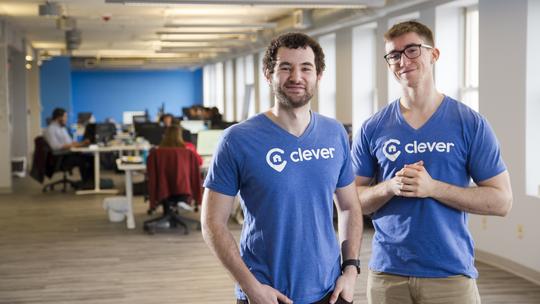
A new culture
At Clever Real Estate, Babich doesn’t rule out there being a time in the future when the startup operates entirely without an office. But for now, it’s keeping its space in the Delmar Loop.
That’s in part because Babich says there’s still an expectation from some investors and customers that companies need a physical place to call home. But there's value beyond that, like when it recently went about hiring several new executives and brought the prospective hires to the office as part of the interview process. It’s also had conversations about whether to base a portion of its customer service operation in St. Louis, believing there could be benefits of that team working together in an office.
A vibrant company culture, however, is no longer intrinsically tied to having a physical office.
Babich said he considers the culture at Clever to be as strong as it's ever been. The shift to remote work forced the company to increase its communication with employees and to ensure collaboration between the team.
“It starts to bleed over into the more informal kinds of communication, like team members hang out now in ways and form kind of cross-team relationships in ways that they didn't when we were in office,” Babich said.”(There’s) the group of people who are hanging out, watching Marvel movies over Zoom and playing Jackbox games and little coffee lunches. I think there's an interesting sense of water-cooler chatter that emerged about three, four months in that we learned how to do digitally.”


